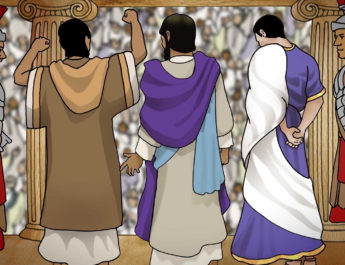Romans 14:1-12
Ordinary A42
1 WelcomeA those who are weakB in faith,C but not for the purpose of quarrelingD over opinions.E
A “welcome” = proslambano. 12x in NT. From pros (at, to, toward, with) + lambano (active acceptance/taking of what is available or what has been offered; emphasizes the choice and action of the individual). This is to take aside, accept, receive, or welcome. It can be to take in a friendly or hospitable sense or to eat (i.e. take food).
B “weak” = astheneo. From asthenes (not having strength or weak in a moral sense; sick); {from a (not) + sthenes (strong, vigor); {from the base of sthenoo (to strengthen so that one can be mobile); from sthenos (strength)}}. This is sick, feeble, languishing, impotent. Can also refer to moral weakness.
C “faith” = pistis. From peitho (to have confidence, urge, be persuaded, agree, assure, believe, have confidence, trust). This is less about knowing, believing, and repeating a list of doctrines then it is about trusting God. Faith means listening to God and seeking to live a holy life even (and especially) when we don’t understand how everything works or fits together. Faith is about being faithful (trusting and doing) rather than being all knowing.
D “quarreling” = diakrisis. 3x in NT. From diakrino (to judge, separate, contend, investigate, thoroughly judge); {from dia (through, across to the other side, thoroughly) + krino (to judge, decide, think good, condemn, determine, pass judgment, stand trial, sue; judging whether in court or in a private setting; properly, mentally separating or distinguishing an issue – to come to a choice or decision, to judge positively or negatively in seeking what is right or wrong, who is innocent or guilty; can imply trying, condemning, punishing, or avenging)}. This is discernment, passing judgment, or deciding.
E “opinions” = dialogismos. 14x in NT. From dialogizomai (to consider, have a back and forth debate with an uncertain conclusion; multiple confused minds reinforcing a faulty conclusion); {from dia (through, because of, across, thoroughly) + logizmai (to compute or reckon up, to count; figuratively, it is coming to a conclusion or decision using logic; taking an inventory in a literal or figurative sense); {from logos (word, statement, speech, analogy; here, word as an account or accounting; can also be a word that carries an idea or expresses a thought, a saying; a person with a message or reasoning laid out in words; by implication, a topic, line of reasoning, or a motive; can be used for a divine utterance or as Word – Christ); from lego (to speak, tell, mention)}. This is reasoning, plotting, argument, discussion that reinforces faulty reasoning, debate.
2 SomeF believeG in eating anything, while the weak eat only vegetables.H
F {untranslated} = men. This is truly, indeed, even, in fact. Often, it is not translated, but used to emphasize affirmation.
G “believe” = pisteuo. Related to “faith” in v1. From pistis (see note C above). This is to believe, entrust, have faith it, affirm, have confidence in. This is less to do with a series of beliefs or doctrines that one believes and more to do with faithfulness, loyalty, and fidelity. It is trusting and then acting based on that trust.
H “vegetables” = lachanon. 4x in NT. From lachaino (to dig). This is a vegetable, herb, or other plant in a garden.
3 Those who eat must not despiseI those who abstain,J and those who abstain must not pass judgmentK on those who eat; for GodL
I “despise” = exoutheneo. 11x in NT. From ek (from, from out of) + oudeis (no one, none, nothing; ruling out absolutely); {from oude (and not, neither, not even) {from ou (not, no) + de (but, and, now, indeed)} + heis (one, first, alone)}. Properly, this is casting someone or something out as nothing, consider someone or something nothing – of no account. This would be to treat someone with utter contempt or to ignore them.
J “abstain” = me + esthio. Literally “not eating.”
K “pass judgment” = krino. Related to “quarreling” in v1. See note D above.
L “God” = theos. From Proto-Indo-European origins, meaning do, put, place. This is God or a god in general.
4 Who are you to pass judgment on servantsM of another?N It is before their ownO lordP that they standQ or fall. And they will be upheld,R for the Lord is ableS to make them stand.
M “servants” = oiketes. 5x in NT. From oikeo (to stele or be established somewhere in a permanent way, to make a home or live at home); from oikos (house – the building, the household, the family, descendants; the temple). This is a servant working in a house.
N “another” = allotrios. 14x in NT. From allos (other, another; another of a similar kind or type). This is strange, another foreign. It is something that belongs to someone else. It could mean hostile or alien.
O “own” = idios. This is something that belongs to you or that is personal, private, apart. It indicates a stronger sense of possession than a simple possessive pronoun. This is where “idiot” comes from (denoting someone who hasn’t had formal training or education and so they rely on their own understanding).
P “lord” = kurios. From kuros (authority, supremacy). This is a respectful address meaning master or sir. It refers to one who has control or power greater than one’s own. So, it was also applied to God and Jesus as Master or Lord.
Q “stand” = steko. 11x in NT. From histemi (to stand, place, establish, appoint, stand ready, be steadfast). This is to stand fast or be stationary. Figuratively, it can mean to persevere.
R “upheld” = histemi. Related to “stand” in v4. See note Q above.
S “is able” = dunateo. From dunatos (mighty or powerful; ability of persons, possibility of things; what can be given the power or ability that the subject exhibits); from dunamai (to be able, have power or ability). This is to be able or powerful. It is using power that cannot be stopped. It is the same root as the Greek word for “miracle.”
5 SomeT judge one day to be better than another, while others judge all days to be alike. Let all be fully convincedU in their own minds.V 6 Those who observeW the day,X observe it in honor of the Lord. Also those who eat, eat in honor of the Lord, since they give thanksY to God; while those who abstain, abstain in honor of the Lord and give thanks to God.
T {untranslated} = men. Same as {untranslated} in v2. See note F above.
U “be fully convinced” = plerophoreo. 6x in NT. From pleres (to be full, complete, abounding in, or occupied with); {from pletho (to fill, accomplish, supply; to fill to maximum capacity)} + phoreo (to bear constantly or habitually or repeatedly; it can mean to wear or carry a burden); {from phero (to bear, bring, lead, make known publicly; to carry in a literal or figurative sense)}. This is to fulfills, fully convince, satisfy, accomplish, fully assure. It can be to fully convince by using evidence or to make full.
V “minds” = nous. From noos (mind) OR from the same as ginosko (to know, recognize, realize, perceive, learn; gaining knowledge through personal experience). This is mind, understanding, reasoning faculty, intellect, capacity to reflect. It can refer to God’s mind or human minds – thoughts, feelings, will, or reflective thinking.
W “observe” = phroneo. From phren (diaphragm, heart, intellect, understanding; figurative for personal opinion or inner mindset; thought regulating action; sympathy, feelings, cognition); perhaps from phrao (to rein in or curb). This is to think, judge, use one’s mind, have an opinion, shape one’s opinion through action. It refers to one’s insight or inner perspective expressing itself through behavior.
X Some manuscripts add “those not observing the day of the Lord.”
Y “give thanks” = eucharisteo. From eu (good, well, well done, rightly) + charis (grace, kindness, favor, gratitude, thanks; being inclined to or favorable towards – leaning towards someone to share some good or benefit; literal, figurative, or spiritual; grace as abstract concept, manner, or action); {from chairo (to rejoice, be glad; used to say hello; properly, delighting in the grace of God or experiencing God’s favor); from char– (to extend favor, lean towards, be inclined to be favorable towards)}. This is giving thanks, being thankful. It is a recognition that God’s grace is good and actively showing gratitude. It can also be used for saying grace before eating. This is where “eucharist” comes from.
7 We do not live to ourselves, and we do not die to ourselves. 8 If we live, we live to the Lord, and if we die, we die to the Lord; so then, whether we live or whether we die, we are the Lord’s. 9 For to this end ChristZ died and lived again, so that he might be LordAA of both the dead and the living.
10 Why do you pass judgment on your brotherBB or sister? Or you, why do you despise your brother or sister? For we will all stand beforeCC the judgment seatDD of God.
Z “Christ” = christos. From chrio (consecrate by anointing with oil; often done for prophets, priests, or kings). Literally, the anointed one, Christ. The Greek word for Messiah.
AA “be Lord” = kurieuo. Related to “lord” in v4. 7x in NT. From kurios (see note P above). This is to be lord of, rule, lord over.
BB “brother” = adelphos. From a (with, community, fellowship) + delphus (womb). This is a brother in a literal or figurative sense. It is also used of another member of the Church.
CC “stand before” = paristemi. Related to “stand” and “upheld” in v4. From para (from beside, by) + histemi (see note Q above). This is literally to place by stand. It can mean to present, exhibit, appear, bring, stand by, or prove. It can also mean to be ready, to assist, to yield, or to commend.
DD “judgment seat” = bema. 12x in NT. From the same as basis (a pace, base, step, foot); from baino (to walk, go). This is a place that is raised and has steps such as where a tribunal would meet to mete out justice. It also refers literally to the chair from which such justice would come whether for reward or punishment. This word was borrowed into Jewish religious practice from Byzantine Greek (from the same root) to describe the raised area of the synagogue from which the Torah was proclaimed – the bima. See https://en.wiktionary.org/wiki/%D7%91%D7%99%D7%9E%D7%94#Hebrew
11 For it is written,
“As I live, says the Lord, every knee shall bow to me,
and every tongueEE shall give praiseFF to God.”
12 So then, each of us will beGG accountableHH to God.
EE “tongue” = glossa. Root refers to a point that sticks out. This is tongue ina literal sense, but can also refer to language or a nation that speaks a different language. Figuratively, it can also refer to speaking in tongues or speech inspired by the Spirit.
FF “give praise” = exomologeo. Related to “opinions” in v1 & “says” in v11. 10x in NT. From ek (from, from out of) + homologeo (to agree, speak the same, declare, promise, praise, celebrate; to align with, express the same conclusion, endorse); {from homologos (of one mind); {from homos (the same) + lego (see note E above)}}. This is agree, consent, or acknowledge. It can also be confess, give thanks, or praise. It includes an open, public, unabashed declaration.
GG “be” = didomi. Literally “give account.” To give, offer, place, bestow, deliver. This is give in a literal or figurative sense.
HH “accountable” = logos. Related to “opinions” in v1 & “says” and “give praise” in v11. From lego (see note E above). This is word, statement, speech, analogy. It is a word that carries an idea or expresses a thought, a saying. It could refer to a person with a message or reasoning laid out in words. By implication, this could be a topic, line of reasoning, or a motive. It can be used for a divine utterance or as Word – Christ.
Image credit: “Painting” photograph by Hans Splinter, 2009.




